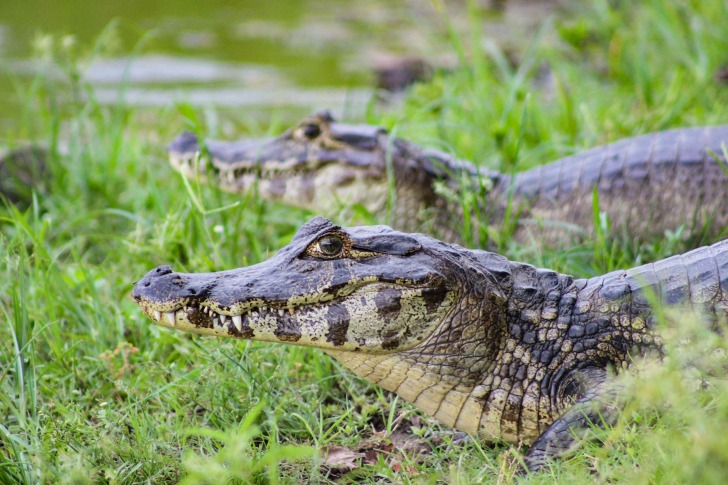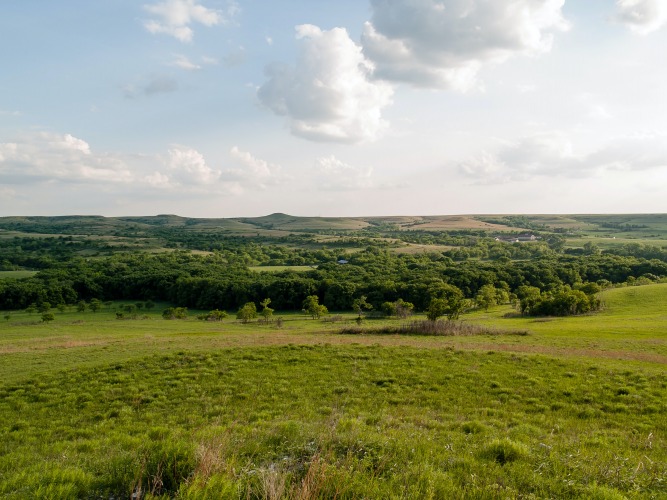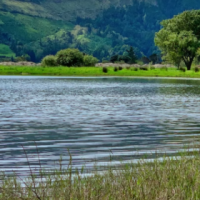While Kansas is not exactly known as an alligator hotbed, that does not mean that the Midwest is completely free of American alligators altogether.
Kansas residents who are looking to check out alligators can make a quick trip down to Oklahoma.
The Red River in Southeastern Oklahoma is a common place for these animals to be found in the region.
In order to learn more about Kansas and its alligator presence (or lack thereof), please be sure to read on.

Contents
So… Are There Alligators in Kansas?
While alligator sightings are that common in Kansas, that does not mean that they never happen at all.
In fact, alligators were spotted in the state in 2020 and 2021.
Any alligator that is found in the state is in trouble, though.
They are not native to the area.
Alligators do not have the ability to survive the climate but that does not stop people from trying to keep them as pets.
The 2020 incident took place at Wildcat Creek, where a small alligator was discovered.
At first, its appearance was linked to the Reptile World location in Manhattan, Kansas.
During this time period, alligators vanished from the store, and the owners were left scrambling.
Unfortunately, their missing alligators happened to be much larger than the one that was found at Wildcat Creek.
Since alligators have no ability to withstand the temperatures that a Kansas winter has to offer, these types of stories tend to be very disheartening.
Meanwhile, the 2021 sighting was also chilling in its own right.
A Kansas Department of Transportation worker happened to be working on the Ninnescah River bank and discovered an alligator carcass.
In this instance, it is believed that the alligator was placed by a thoughtless resident.
Alligators are typically only going to be found in Kansas when someone attempts to keep one as a pet.
Once they inevitably outgrow these circumstances, they are disposed of in cruel ways.
These sightings are nothing for the average Kansas resident or visitor to fear but they are worth noting.
Alligator Species In Kansas
As mentioned above, there are no alligator species that are native to the state of Kansas.
Yes, Kansas residents may come across an alligator if they are traveling in the region but you will have to drive to Oklahoma in the vast majority of instances.
The state does not have any laws in place that prohibit residents from keeping them as pets.
They do not breed in Kansas, though.
That’s why most sightings in the state are attributed to pet ownership gone wrong.
Of course, residents have to remain up to date on their own jurisdictions.
There are no state laws in place that forbid the ownership of alligators but there are local jurisdictions that look to eliminate the practice.
That is because even the most well-intentioned owners could be placing themselves and their surroundings at risk by harboring them as pets.
Alligators grow far more rapidly than most expect.
It does not take long for them to exceed the three-foot mark in length and by then, keeping them in the vast majority of homes becomes untenable.
From there, they are released into Kansas rivers, where they have no hope of survival.
Owners should not take on the task of attempting to care for them for this reason above all.
Is It Safe To Swim In Kansas?
Kansas does not present many obstacles in this regard but that does not mean that residents have nothing to consider.
The Kansas Department of Health and Environment (KDHE) and the Kansas Department of Wildlife and Parks are both issuing warnings to would-be swimmers.
Blue/green algae are often found in the state’s bodies of water, which bears monitoring.
Those who choose to swim while neglecting these warnings are placing themselves in a potentially disadvantageous position.
These poisonous blooms develop rapidly and they often look harmless to a swimmer that is not aware of their danger.
The blooms may look like paint or scuff marks on the water but they should not be approached for any reason.
Blue, bright green, brown, or red colorations are the most common in these instances.
If the water is looking suspicious to the swimmer, it should be avoided.
The same goes for beach visitors who notice algae blooms by the shore.
Children and pets cannot be exposed to these blooms for any reason.
The toxins can cause all sorts of issues since they are easily ingested by swimmers.
Swimmers are also at risk of coming into direct contact with them while they are in the water.
Once the swimmer has come into contact with them, they are subject to a wide range of symptoms.
Rash, vomiting, diarrhea, fever, sore throat, and headache are common in these instances.
Any swimmer that finds themselves experiencing these symptoms should seek medical assistance immediately.
If you find that your pet or your child has come into contact with this poisonous algae, you can rinse the area for the best results.
All of these incidents should be reported, so that other potential swimmer can be warned before it is too late.

Interesting Alligator Facts In Kansas
Even if there are not too many alligators to be found in Kansas, there is still one very interesting legend that we must share.
Allegedly, there is a massive monster that lurks within a sinkhole in Kansas.
If true, this monster is far more terrifying than any alligator that you will ever come across.
He goes by the name of Sinkhole Sam and he is the most terrifying monster that the state has ever known.
The gigantic creature, which has been compared to a snake, has been seen in the Big Sinkhole.
Yes, that is the official name according to the good folks at the Kansas State Department of Transportation.
This legend has been circulating since 1952 and in 1953, Albert “Bert” Neufeld is said to have fired two shots from his hunting rifle at the beast.
Obviously, his attempt was futile.
According to Kansas legends, the creature is at least 15 feet long and could be as long as 30 feet.
Inman, Kansas is the location where Sinkhole Sam is said to remain today.
Dr. Erasmus P. Quattlebaum claims the creature is actually known as a “foopengerkle,” which has been known to reside in these Kansas caverns.
This would explain why such a large creature is able to reside in subterranean areas.
This sinkhole seems to serve as the swimming pool for Sinkhole Sam.
It was eventually concluded that fishers and swimmers did not have anything to worry about but that has not stopped the legend from persisting.
Every location has its own version of the Loch Ness Monster, it seems.
Alligators vs. Crocodiles
Alligators and crocodiles are not going to be found here but there are a few key facts about each that Kansas residents and visitors should be keeping in mind.
For starters, they do not look the same.
A crocodile has a V-shaped snout, while an alligator has a U-shaped snout.
Crocodiles also tend to be far more aggressive, whereas alligators are more content to hang out.
They are not the type of animal to show much aggression unless they feel as if they are being cornered.
While a crocodile is more likely to attack based on skill and precision, alligators are far more opportunistic.
They will wait until they can find injured prey before they spend a great deal of time stalking one.
3 Safety Tips for Swimming in Alligator-Infested Waters
1. Watch Small Children and Pets Closely
Small children and pets are likely to engage in the sort of splashing that is sure to attract alligators.
The more noise that small children and pets make, the more likely they are to attract unwanted visitors.
Since they are more challenging to control, they should be watched closely.
2. Use The Buddy System
Swimming alone in alligator-infested waters is not advisable.
By having extra sets of eyes with you, you can steer clear of potential alligator encounters before they even have a chance to take place.
3. Never Approach An Alligator
If you happen to come across an alligator during a swimming session, do not approach the animal for any reason.
They are not typically inclined to approach people or attack them unless they are feeling threatened.
Do your best to steer clear in these instances.
Summary
While there is not much to worry about from an alligator standpoint for Kansas residents and visitors, that does not mean that there are no worries at all.
As discussed above, algae blooms are a far bigger issue than alligators.
If alligators are found, they are usually the product of overzealous would-be pet owners.
They do not breed in the state of Kansas and have no ability to survive the winter.
That’s why they should not be owned by any private residents.
No state laws are on the books that govern alligator ownership but local jurisdictions have taken steps to outlaw the practice.
Kansas Safety Overview
READ THE FULL REPORT: Kansas Safety Review
Safety Index:
- OVERALL RISK: LOW
- TRANSPORT & TAXIS RISK: MEDIUM
- PICKPOCKETS RISK: LOW
- NATURAL DISASTERS RISK: MEDIUM
- MUGGING RISK: LOW
- TERRORISM RISK: LOW
- SCAMS RISK: LOW
- WOMEN TRAVELERS RISK: LOW
Frequently Asked Questions
What are the exotic pet laws in Kansas?
Most Kansas residents are aware of the fact that there are no laws on the books that govern their ability to own exotic pets.
The laws that Kansas jurisdictions have in place are designed to protect the local ecosystem and the surrounding society where the pet exists.
Kansas allows residents to own alligators if the pet has been required legally.
Pet owners are typically asked to prove that they have acquired an exotic pet by legal means as well.
Local jurisdictions may prohibit the ownership of these pets, however.
What’s the closest alligator population?
It should go without saying that alligator populations are not common in the Midwest but that does not mean there are none in the area.
In fact, Kansas residents that are looking to check out alligators are able to head to Oklahoma.
In the southeastern portion of the state, alligators reside in the Red River.
Any alligators that are found in Kansas are the product of pet owners and they are not native to the state.
Are alligators often found in Kansas?
The American alligator does not breed in Kansas and the winters are too cold for them to survive.
Yes, alligators are found in the state of Kansas but these cases are aberrations.
The aforementioned laws have been put into place so that they can be avoided.
Otherwise, the animals are released into the wild where they cannot be expected to survive.
The state does allow for alligator pet ownership but the owner is expected to provide proper containment that mimics their natural habitat as much as possible.











